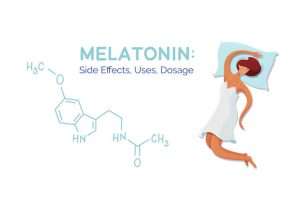How Melatonin Can Help You Fix Your Sleep Cycle; complete guide about melatonin
What is melatonin?
Melatonin is a hormone that the body naturally produces in order to maintain a normal sleep-wake cycle, also known as the circadian rhythm. An individual sleeps for 8 hours on average and is awake for about 16 hours, during which she or he goes about with her/his daily activities. The levels of melatonin rises during the night and falls during the day. Melatonin levels regulate the body’s sleep-wake cycle.
Related Product – melatonin
What is the Mechanism of Action of Melatonin?
Melatonin’s primary function is to regulate the body’s circadian rhythm. Darkness stimulates the production of melatonin and prepares the body for sleep. Daylight reduces its production, and the body is awake. People who have sleep problems at night have low melatonin levels and may require melatonin supplementations or medicine to fall asleep. There are many herbal supplements that contain melatonin and can be used to improve sleeping patterns in people who have trouble sleeping through the night.
What are the Uses of Melatonin?
Melatonin is primarily used to combat jet lag. Individuals who travel from one continent to another have difficulty sleeping due to a shift in the sleep-wake cycle. Melatonin can help him or her adjust to the local time zone during this period. Melatonin can also be used by people who work the night shift because their sleep-wake cycle is reversed, and melatonin is quite effective for getting a restful sleep. Melatonin can also help visually impaired people who struggle to maintain a day-night cycle.
Melatonin is quite effective in treating conditions like insomnia
It is also beneficial to those who suffer from REM sleep disorder. People with ADHD have difficulty sleeping, and melatonin can be used to help such people sleep. Melatonin is also beneficial for people who suffer from hypertension medication-related insomnia, such as beta blockers. Melatonin is also beneficial for people who have quit smoking and are experiencing withdrawal symptoms such as insomnia. Melatonin has also been used to treat conditions such as COPD, endometriosis, dementia, fibromyalgia, restless leg syndrome, nonalcoholic liver disease, and inflammatory bowel disease in some cases. Melatonin can also be used as a calming agent for people who are about to undergo surgery, calming them down before the procedure.
Related Article – Melatonin: What Is It And What Can You Use It For?
Natural sources of melatonin:
1. Milk:
It should come as no surprise that milk contains melatonin. The type of milk, as well as the diet of the cows, are likely to influence the amount of melatonin present. Interestingly, the amount of melatonin in milk has a circadian rhythm. This could imply that cows milked at night have significantly higher melatonin levels than cows milked during the day. Of course, unless you get milk fresh from the farm and know when the cows were milked, this information is useless. Milk also contains tryptophan and calcium, both of which are associated with sleep. Calcium is important because it aids in the production of melatonin. So, even if the milk you’re drinking contains a low level of melatonin, you’re still signing up for benefits.
2. Strawberries:
We already mentioned grapes and tart cherries. Strawberries are a third type of fruit with high melatonin levels. Strawberries, as a type of berry, are also high in antioxidants and contain important pigment compounds known as anthocyanins. This is a type of polyphenol that you should include in your diet on a regular basis. Melatonin is found in other fruits as well, but at much lower concentrations. If you want to get melatonin from fruit, stick to tart cherries, grapes, and strawberries.
3. Grapes:
Grapes are interesting for their melatonin content because some varieties contain significant amounts of the compound while others contain almost none. However, you won’t know whether the grapes you’re eating are high in melatonin or not. The dramatic differences in melatonin content suggest that it’s important not to overthink melatonin. If you eat melatonin-rich foods on a regular basis, you’re probably getting a good amount of the compound in your diet. It would be an unrealistic and stressful goal to try to optimise your melatonin intake. Melatonin is also found in wine. This effect is not solely due to the melatonin in grapes. During the fermentation process, some melatonin is also synthesised.
4. Walnuts
Walnuts are the second type of nut to look for melatonin in. Their main advantage is that they are significantly less expensive than pistachios. Furthermore, walnuts have been linked to a number of health benefits, including the ability to improve cognition. The issue is that walnuts have a much lower melatonin content than pistachios. So, while walnuts contain some melatonin, pistachio nuts are always a better choice.
5. Kidney beans:
While most types of beans contain some melatonin, kidney beans are an especially good choice. They are also a popular and widely available type of bean. Furthermore, kidney beans are a key ingredient in a plethora of recipes. It is common practise to soak the beans before using them. This can take some time, but it is well worth the effort.
6. Capsicums:
Melatonin is found in most vegetables, though the amounts vary greatly. Capsicums (also known as peppers) are a popular choice because they contain a lot of melatonin. Capsicum comes in a variety of colours, including red, yellow, orange, and green. Each type has its own nutrient and plant-based compound balance. The flavours are also distinct. Red pepper, for example, has a slightly sweet flavour, whereas green pepper has a much sharper flavour.
7. Tomato:
Melatonin is also found in tomatoes. They’re also notable for having a high lycopene content. Lycopene is a rare pigment molecule that acts as an antioxidant. Aside from that, tomatoes taste good and are simple to prepare. You can slice them for sandwiches, chop them for salads, or use them in a wrap. Then there are all the meals that include fresh tomatoes. Tomato-based products, such as canned tomatoes, tomato paste, and sundried tomatoes, provide some of the same benefits. Although less is known about the melatonin content of these products, they are still worth using for the nutrients they provide.
Related Article – Sleeping with Melatonin: Is It Effective?
Melatonin Side effects in Children and adults
Side effects of melatonin 10 mg may be caused by its usually large doses. These include:
Drowsiness
Headache
Stomach Upset
If you’re struggling with sleep issues then you should definitely consider melatonin supplementation from India’s leading Health & Nutrition brand called Plix Life. It is a Mumbai-based company that is delivering good health in tastier, easy-to-consume ways.
Plix Life is a Mumbai-based company that has mastered the art of delivering good health in a palatable way! Its solution for improving sleeping pattern ‘Deep Sleep Mini Mints’ is powered with melatonin and ayurvedic herbs like Jatamansi that synergistically work to help you get better sleep, feel more relaxed and tackle stress in a better way.
Related Article – The Best Sleeping Pills to Help You Get a Good Night’s Sleep
FAQs
1. What is the use of melatonin?
Melatonin is a hormone produced naturally by the body and released into the bloodstream when exposed to darkness. Lifestyle practises such as an overnight job or a disruption in our sleeping patterns frequently disrupt our melatonin hormones. Melatonin supplements, thankfully, can help keep this important hormone in check.
2. Are supplements safe for consumption?
Melatonin supplements are risk-free. No confirmed cases of melatonin toxicity or overdose have been reported. If you have any questions about what melatonin dosage is best for you, you can consult your doctor for more information.
3. Is it safe for my kid?
Melatonin can be safely consumed by children with the approval of a paediatrician. Melatonin may or may not be an appropriate treatment for a child, depending on their age, dosage, and underlying sleep disorder. Consult a healthcare professional before giving melatonin to a child to ensure that the supplement is safe and effective. Melatonin is most commonly used in children with ADHD (Attention Deficit Hyperactivity Disorder), sleep disorders, visual impairment, Autism, or other developmental disabilities, according to studies.
4. How is Plix Deep Sleep Mini Mints different from other products?
Melatonin is the major ingredient in various sleep supplements & medicines in the market. Plix’s Deep Sleep Mini Mints also contain the Ayurvedic herb Jatamansi, which promotes stress relief and relaxation while also aiding in sleep which sets it apart from the other brands.
5. Are there any side effects of Deep Sleep Mini Mints?
Deep Sleep is completely natural, so it can be used indefinitely without causing dependency or any known risk of side effects.














